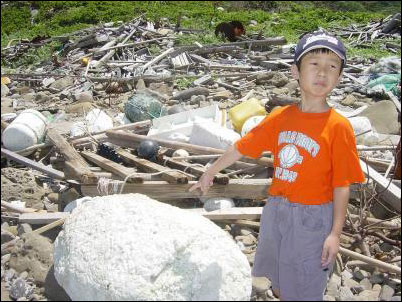The ocean is called for by biodegradable plastic
The ocean called for help by billions of kilograms of plastic floated on the surface of the sea, there was a material that was difficult to decompose and decomposed at a rapid rate and released many toxic substances into the sea.
In the first study of the billions of kilograms of plastic that floated on the surface of the sea (often garbage is swept from the shore to the ocean) for years, scientists have found floating materials. The sound of this disintegration is decomposed at a surprisingly fast rate and releases many toxic substances into seawater.
Announcing at the 238th National Conference of the American Chemical Society, researchers talked about their 'very strange ' finding . They still argue that plastic in the ocean is not so much, very rare, that some marine creature accidentally eats or is trapped in plastic objects.

A Japanese boy is pointing up the full Styrofoam waste on the beach.(Photo: Katsuhiko Saido)
Researcher in charge of the group, PhD. Katsuhiko Saido recounted: " The plastic used in everyday life is generally considered to be very durable. Yet we found that in the middle of the ocean they were degraded when exposed to the sun, rain and other environmental conditions. Since then, it has become a source of global pollution and continues to increase in the future . '
He said that polymers begin to degrade within a year, releasing substances that can be detected at concentrations of about parts per million. These chemicals break down on the ocean surface and inside the bodies of marine animals. The amount of plastic floating up and down the ocean so decomposition products become a matter of concern.
Every year in Japan alone there are about 150,000 tons of waste plastic, most notably Styrofoam (ie polistiren) is washed away to the sea. They were hit and pushed away very far, anywhere on the sea.
The sea called ' The Big Pacific Landfill ' between California and Hawaii is twice as wide as Texas, mostly floating plastic.
Saido, a chemist, a School of Pharmacy, at Nihon Chiba University, Japan, said his research team has found that when plastics degrade, they often release into seawater of bisphenol A (BPA) very toxic. and polistiren oligomes, polluting the sea.

The sea of Vietnam is no less than the sea of plastic pollution.(Photo: VNN)
Plastics do not decompose when marine animals fail to eat, so they may not be toxic to them. However, they are poisoned when they absorb chemicals decomposed by plastics and into the ocean. It is these substances that affect their lives. Polistiren's BPA and oligome substances can disrupt hormones and seriously affect the fertility of marine animals.
Some studies have shown that despite very low levels of exposure to BPA, containers or other types of packages release harmful effects on the health of organisms .
Saido presented a new method that he used to simulate low-temperature plastic disintegration, such as ocean temperatures.
This process includes experiments such as modeling room-temperature plastic disintegration, separating the heat from the plastic, using a liquid to extract the polysiren's BPA and oligomer.
He says the Styrofoam foam plastic is easily broken by ocean waves.
The team also reported that they did not see the three most toxic substances (which Styrofoam could produce) in nature. It is monomers of stiren (MS), stirring dime (DS) and stiren trime (TS) that everyone knows that MS definitely causes cancer, DS and TS are suspected of causing cancer.
TS will generate SM and DS when thermal decomposition. But the trime itself also threatens the lives of creatures.
- Biodegradable plastics help reduce environmental pollution
- Young girl preparing plastic bag that decomposes in a few weeks from skin and fish scales
- Hanoi University of Technology successfully researched self-destructing plastic bags made from cassava flour
- Produce 100% organic biodegradable plastic bags, environmentally friendly
- Waste of biodegradable plastics produces greenhouse gases
- Self-destructable wood from rice hulls
- Detection of bacteria capable of biodegradable plastic
- Successfully manufactured biodegradable plastic materials
- Biodegradable shoes
- This bag is what will change the entire fight against plastic around the world
- 269,000 tons of contaminated plastic floated on the ocean
- Bio-plastics from safe plants to the environment
 Surprised: Fish that live in the dark ocean still see colors
Surprised: Fish that live in the dark ocean still see colors Japan suddenly caught the creature that caused the earthquake in the legend
Japan suddenly caught the creature that caused the earthquake in the legend A series of gray whale carcasses washed ashore on California's coast
A series of gray whale carcasses washed ashore on California's coast Compare the size of shark species in the world
Compare the size of shark species in the world Even if humanity becomes extinct, these three traces of humanity will still exist almost forever!
Even if humanity becomes extinct, these three traces of humanity will still exist almost forever!  Microplastics found in more than 50% of clogged atherosclerotic plaques
Microplastics found in more than 50% of clogged atherosclerotic plaques  New Biodegradable Plastic Invention Leaves No Microplastics Behind
New Biodegradable Plastic Invention Leaves No Microplastics Behind  Mealworms - a promising solution to the threat of plastic waste
Mealworms - a promising solution to the threat of plastic waste  More than 6 million tons of plastic waste are floating in rivers, lakes and oceans.
More than 6 million tons of plastic waste are floating in rivers, lakes and oceans.  Turning plastic waste into a trendy trend
Turning plastic waste into a trendy trend 